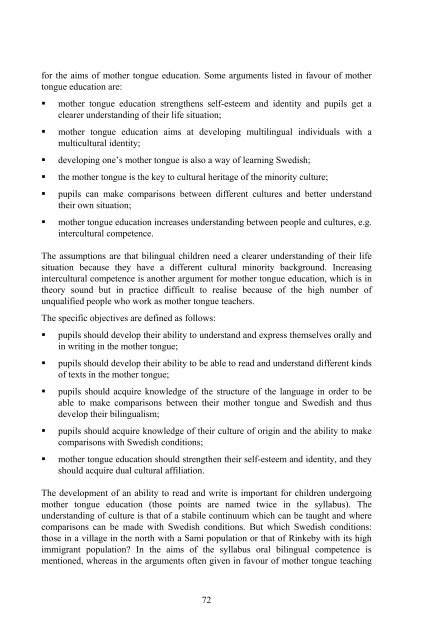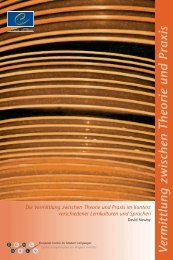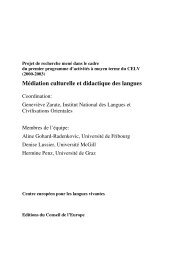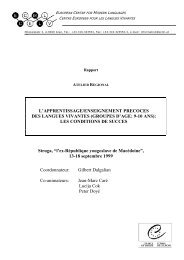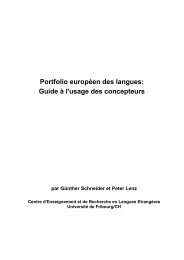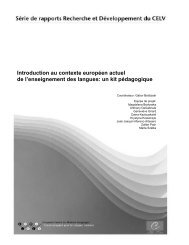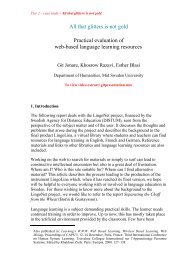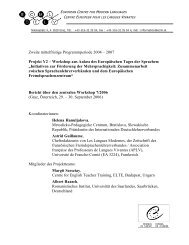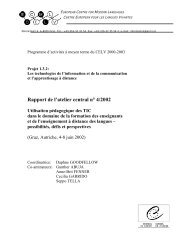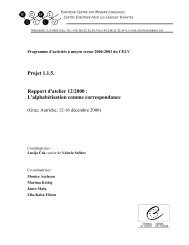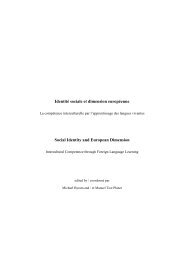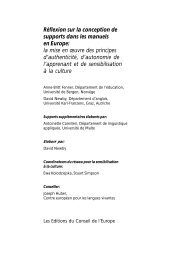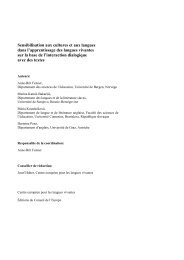cohesion - European Centre for Modern Languages
cohesion - European Centre for Modern Languages
cohesion - European Centre for Modern Languages
Create successful ePaper yourself
Turn your PDF publications into a flip-book with our unique Google optimized e-Paper software.
<strong>for</strong> the aims of mother tongue education. Some arguments listed in favour of mother<br />
tongue education are:<br />
mother tongue education strengthens self-esteem and identity and pupils get a<br />
clearer understanding of their life situation;<br />
mother tongue education aims at developing multilingual individuals with a<br />
multicultural identity;<br />
developing one’s mother tongue is also a way of learning Swedish;<br />
the mother tongue is the key to cultural heritage of the minority culture;<br />
pupils can make comparisons between different cultures and better understand<br />
their own situation;<br />
mother tongue education increases understanding between people and cultures, e.g.<br />
intercultural competence.<br />
The assumptions are that bilingual children need a clearer understanding of their life<br />
situation because they have a different cultural minority background. Increasing<br />
intercultural competence is another argument <strong>for</strong> mother tongue education, which is in<br />
theory sound but in practice difficult to realise because of the high number of<br />
unqualified people who work as mother tongue teachers.<br />
The specific objectives are defined as follows:<br />
pupils should develop their ability to understand and express themselves orally and<br />
in writing in the mother tongue;<br />
pupils should develop their ability to be able to read and understand different kinds<br />
of texts in the mother tongue;<br />
pupils should acquire knowledge of the structure of the language in order to be<br />
able to make comparisons between their mother tongue and Swedish and thus<br />
develop their bilingualism;<br />
pupils should acquire knowledge of their culture of origin and the ability to make<br />
comparisons with Swedish conditions;<br />
mother tongue education should strengthen their self-esteem and identity, and they<br />
should acquire dual cultural affiliation.<br />
The development of an ability to read and write is important <strong>for</strong> children undergoing<br />
mother tongue education (those points are named twice in the syllabus). The<br />
understanding of culture is that of a stabile continuum which can be taught and where<br />
comparisons can be made with Swedish conditions. But which Swedish conditions:<br />
those in a village in the north with a Sami population or that of Rinkeby with its high<br />
immigrant population? In the aims of the syllabus oral bilingual competence is<br />
mentioned, whereas in the arguments often given in favour of mother tongue teaching<br />
72


